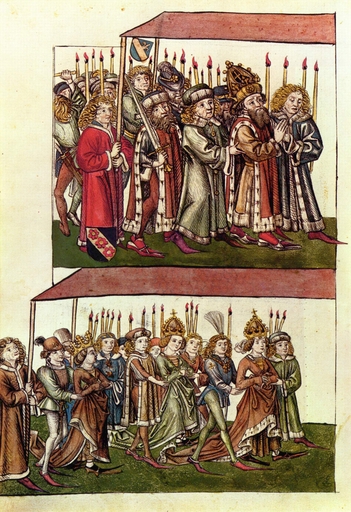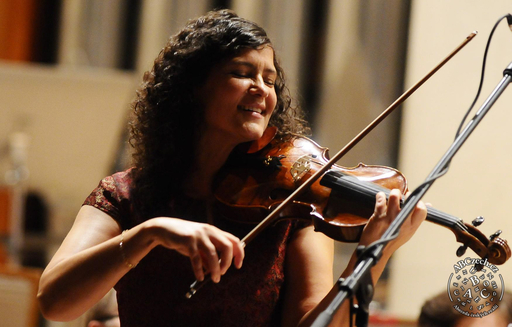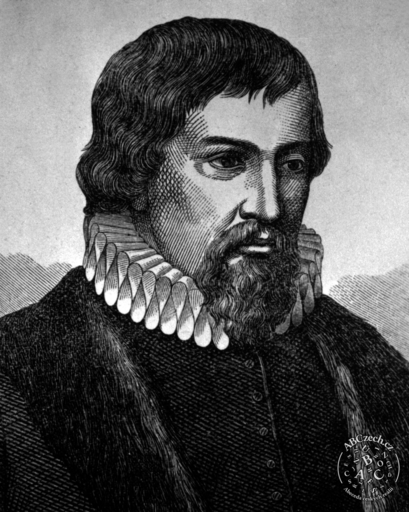
A player of the French horn, conductor and teacher. A long-time soloist, member of the Berlin Philharmonic, one of the best horn players in the world, with a distinctive quality and culture of sound.

A 15th-century collection of polemic texts aimed at Sigismund of Luxembourg, named after the city of Bautzen in Germany, where the manuscript was found.

Conductor, founder of the Prague Chamber Philharmonic, principal conductor of the Czech Philharmonic and the BBC Symphony Orchestra in London. He was only the second conductor, after Herbert von Karajan, to be awarded the Gramophone Award twice in a row.
The Czech family Benda is a prominent equivalent of the German family Bach. The brothers František and Jiří Antonín became founders of Classicism in music and their music influenced the development of Viennese Classicism.

Czech singer regarded as a pop diva and the queen of metal owing to her unrestrained voice.

Czech singer, violinist and composer who combines violin music with original singing. She was an actress in the Goose on a String Theatre in Brno until the second half of the 1980s and is also known for her role of Eržika in the film Ballad for a Bandit (Balada pro banditu).

Poet, translator, historian, grammarian and theoretician of music. Priest and bishop of the Unity of the Brethren and a prominent representative of Czech humanism.

The first half of the 17th century in the Czech lands is connected with tragic events, struggle for religious freedom and the Bohemian Revolt. The Renewed Constitution caused a wave of emigration. Noblemen and intellectuals left the country. Czech Baroque music falls into three developmental phases: Early Baroque (1600–1650), connected with music by Adam Václav Michna from Otradovice, Middle Baroque (1650–1700), connected with the famous “field trumpeter” Pavel Josef Vejvanovský, and High Baroque (1700–1750), whose greatest musicians include Bohuslav Matěj Černohorský and Jan Dismas Zelenka.
A branch of scenic music created as an integral part of films and television productions, contributing to their atmosphere. Music for Czech animated and short films has been internationally acclaimed.

In the Hussite era, poetry and spiritual songs, which were also prayers, had a very important role. Most spiritual sons have been preserved in the Jistebnice Hymnal (Jistebnický kancionál), which contains the most famous war song of the Hussite army Ye Who Are Warriors of God (Ktož sú boží bojovníci). It also contains a record of the song Arise, Arise, Great City of Prague (Povstaň, povstaň, veliké město Pražské).

The oldest surviving melody is the folk spiritual song Lord, Have Mercy on Us (Hospodine, pomiluj ny) from the second half of the 10th century. Another spiritual song, Saint Wenceslas, Duke of the Czech Land (Svatý Václave, vévodo české země), dates from the 12th century. In the 13th century, apart from spiritual music, worldly music also appeared at the courts of Bohemian kings Ottokar II and Wenceslas II, mostly in German style.

Czech 16th-century music is mainly based on the tradition of the monophonic spiritual song. In the second half of the 15th century, brotherhoods od Catholic and Protestant literati appeared, performing church music with polyphonic singing. At the time, there were still court and aristocratic chapels in the country. Works by the educated nobleman Kryštof Harant of Polžice and Bezdružice reached the highest European standards.

In the late 18th and early 19th centuries, tendencies from the previous period persist and many Czech musicians work abroad. The pinnacle of national revivalist tendencies in the spirit of Romanticism was the Czech opera and the favourite compositional form: symphonic poem. They were brought to perfection by Czech composers Antonín Dvořák, Zdeněk Fibich and Bedřich Smetana.

Czech spiritual and secular songs were the most distinct form of folk music, e.g. Saint Wenceslas (Svatý Václave), Jesus Christ Our Salvation (Jezukriste, ščedrý kněze, from the middle of the 14th century) and God Almighty Has Risen (Buóh všemohúcí, from the beginning of the 14th century). The first known Czech music composer is Master Záviš from Zápy (*cca 1350 – † po 1411).

Causes and reasons for Czech artists’ emigration were social (famine and misery in the devastated land), political (absolutism of the Habsburgs) and religious (Catholicism), as well as – and perhaps most importantly – artistic. Musicians, mostly evangelical in faith, went westward, to Germany, France, England, to the then capital city of Vienna, southward to Italy, eastward to Poland and Russia and in the late 18th century to the Balkans as well.

One of the seven state symbols, consisting of the first stanza of the song Where my home is (Kde domov můj). It was first played in the play Fidlovačka in 1834.

One of the best orchestras in the world, with a long history. It held its first concert on Saturday, 4 January 1896, at 7:30 PM, in Rudolfinum, Prague. The orchestra played Antonín Dvořák’s works and the author himself conducted it.

Public station of the Czech Radio focusing on art, classical music, literature and cultural journalism.

Music band known for adaptations of folk songs from Bohemia and Moravia using electric instruments. It is characterised by songs influenced by jazz, big beat, classical and Celtic music. Singer and guitar player František Černý and violinist Karel Holas are the band’s core members.
Late Baroque composer, organ player and teacher, one of the predecessors of Classicism in music. Priest, member of the order of Minorites, who worked alternatingly in the Church of Saint James in Prague and in Italy. In Italy, his students included the famous Italian composer Giuseppe Tartini. He composed mainly vocal and organ music.
2016-2020 ABCzech.cz - © Filozofická fakulta Univerzity Karlovy
Content from this website may be used without permission only for personal and non-commercial purposes and with the source cited. Any other use is allowed only with the authors' consent.
This web application Sonic.cgi meets GDPR requirements. Current information can be found here.